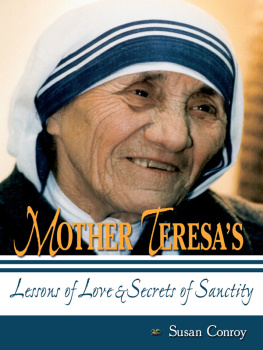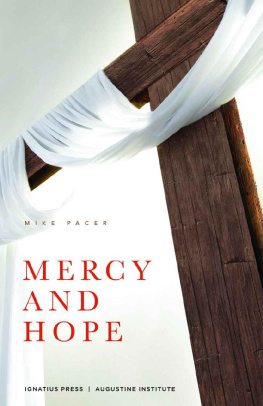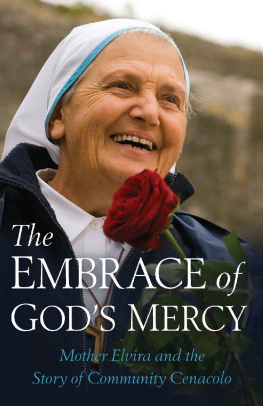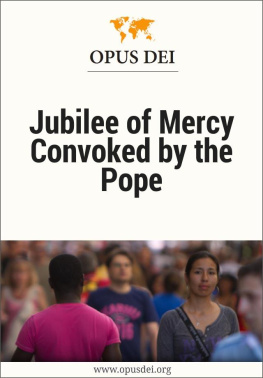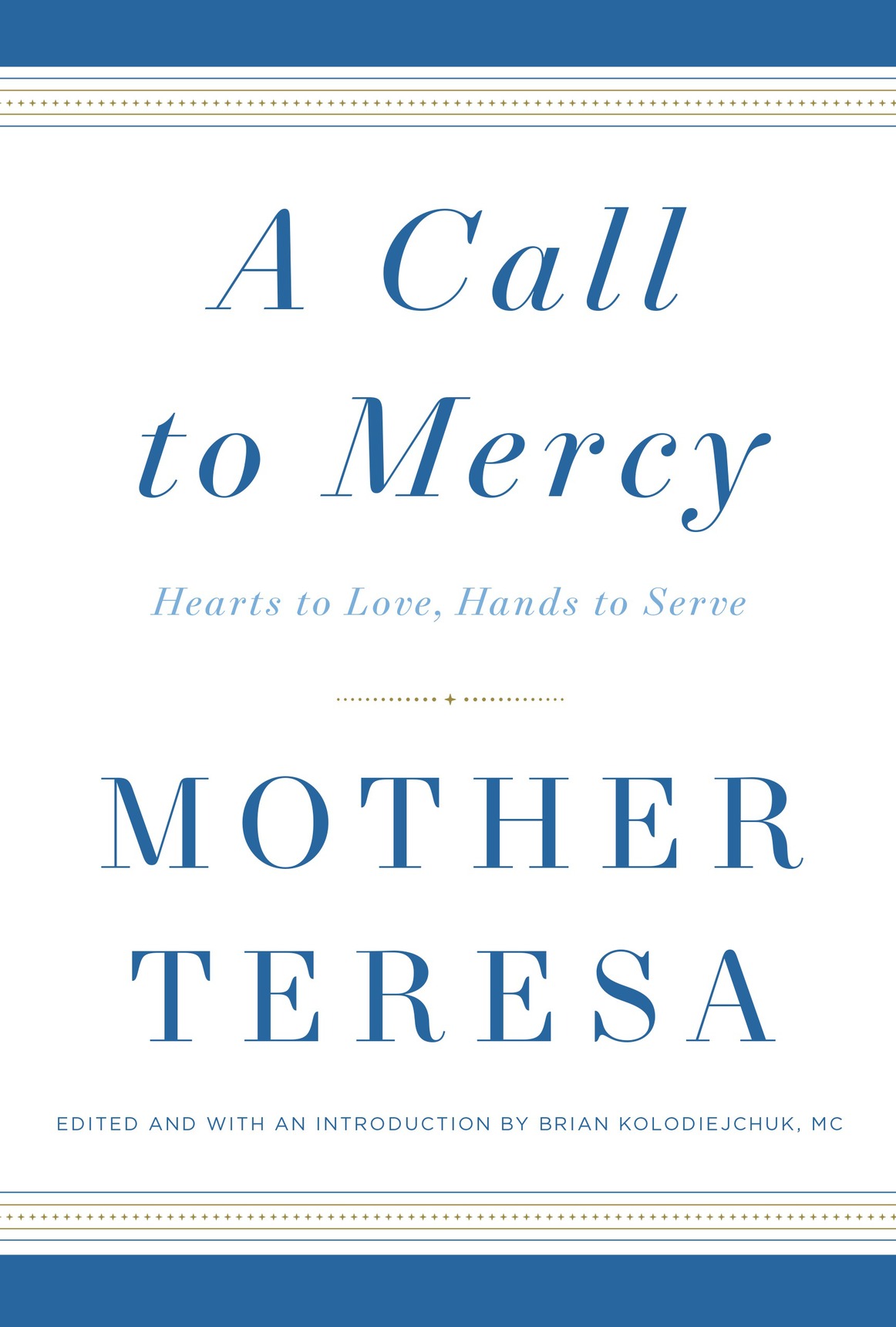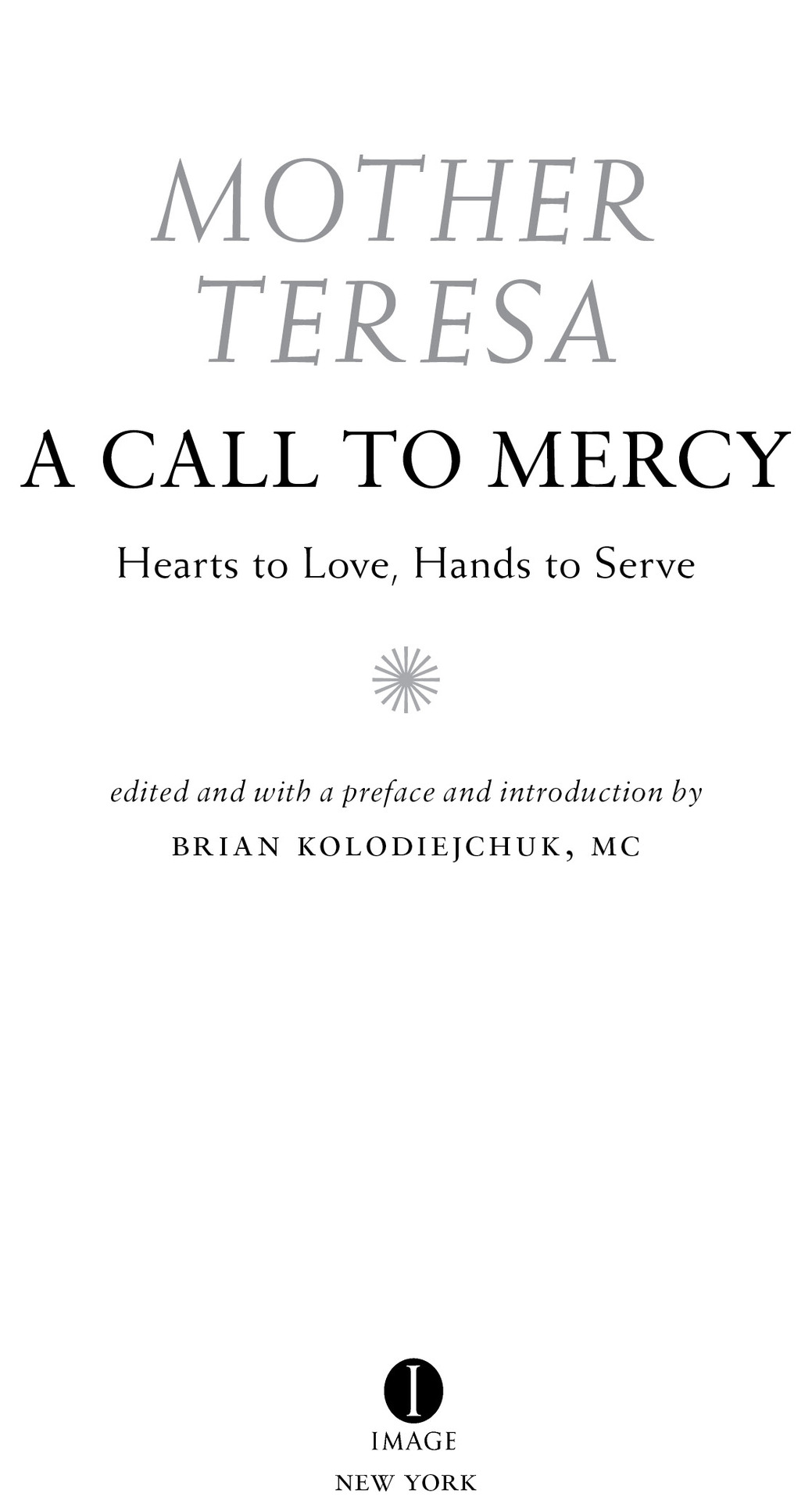



Copyright 2016 by The Mother Teresa Center, exclusive licensee throughout the world of the Missionaries of Charity for the works of Mother Teresa.
All rights reserved.
Published in the United States by Image, an imprint of the Crown Publishing Group, a division of Penguin Random House LLC, New York.
crownpublishing.com
IMAGE is a registered trademark and the I colophon is a trademark of Penguin Random House LLC.
Nihil Obstat: Donald F. Haggerty, S.T.D., Censor Librorum
Imprimatur: Timothy Michael Cardinal Dolan, D.D., Archbishop of New York
The Nihil Obstat and Imprimatur are official declarations that a book or pamphlet is free of doctrinal or moral errors. No implication is contained therein that those who have granted the Nihil Obstat and Imprimatur agree with the content, opinions, or statements expressed.
Library of Congress Cataloging-in-Publication Data is available upon request.
ISBN9780451498205
Ebook ISBN9780451498212
Cover design by Jessie Bright
v4.1
ep
To the poorest of the poor, all those who are unwanted, unloved, rejected, and forgotten, that through the tender and merciful love shown to them by Mother Teresa and those inspired by her, they be certain how precious they are in Gods eyes.
Contents
The Holy Fathers inspiration to proclaim the Extraordinary Jubilee of Mercy came as a quite unexpected but most welcome surprise. In Misericordiae Vultus (MV), the document (a bull of indiction) that established the Extraordinary Jubilee of Mercy, as well as on the many occasions he has spoken on this theme, Pope Francis not only invites us to enter more deeply into the mystery of mercy (MV 2), a gift God always longs to give us, but also seeks to make us aware of our responsibility to extend this gift to others. He presents Jesus as the face of the Fathers mercy, indeed, the expression of the Fathers mercy par excellence.
The joyful occasion of Mother Teresas canonization, which the Holy Father wished to take place during the Jubilee, is a providential opportunity to once again bring her example and message of Gods tender and merciful love to the attention of Christians and all those who look to her as a model of what it is to be a carrier of that love. A Call to Mercy is an attempt to do precisely that.
Although every saint could, in some way at least, be called a saint of mercy, it still may be asked why Gods Providence would have Mother Teresa canonized during this special time. What message does this particular saint of tender and merciful love offer to the universal churchand even beyondon the theme of mercy, which is, as we know, the leitmotif of the Holy Fathers teaching and example. There is a particular resonance between Pope Franciss special attention and love for those on the peripheries of human existence and Mother Teresas preferential choice to serve the poorest of the poor. Tenderness and compassion are the outstanding qualities of the charity that she understood Jesus wanted her to carryto make known and experiencedto the poorest of the poor. For example, she urged her followers to go to the poor with tenderness and serve the poor with tender and compassionate love. This is carrying the love of Jesus, who, she was absolutely convinced, loves each one of us tenderly with mercy and compassion.
In keeping with the Holy Fathers invitation in Misericordiae Vultus for us to rediscover these corporal works of mercy and not to forget the spiritual works of mercy (MV 15), the canonization of Mother Teresa is an opportune occasion to present both her teaching related to merciful love and her way of putting those teachings into practice through her daily action.
It is frequently said that actions speak louder than words; this is a book primarily about Mother Teresas actions. Through her own words, and through the lens of direct witnesses, she emerges as an icon of tender and merciful love, a reflection of Gods mercy for today, especially for the poorest of the poor.
It is my hope that the example of this Saint of Mercy as presented in this book will encourage us to deepen our own relationship with the God of tender and merciful love and to extend this love to our brothers and sisters, especially to those most in need, the materially or spiritually poorest of the poor.
Fr. Brian Kolodiejchuk, MC
Postulator
In Mother Teresas life (19101997), as in the lives of many other saints, we are offered a lived theology. We do not find in her writings or speeches any elaborate explanation on the meaning of mercy. However, we do find a rich heritage of a spirituality of mercy and compassion, as she experienced it personally and lived it out in her service of others. The numerous and very concrete ways of being merciful lived out by Mother Teresa and her followers caught the attention even of the secular world.
Interestingly, mercy is not a word that Mother Teresa employed frequently in her spoken or written word. Nonetheless, she understood herself to be someone in constant need of Gods mercy, not just in a general way as a sinner in need of redemption, but also specifically as a weak and sinful human being who depended entirely on Gods love, strength, and compassion each day. In fact, Jesus Himself had told her when inviting her to found the Missionaries of Charity: You are I know the most incapable person, weak and sinful, but just because you are that I want to use you, for My Glory! This was Mother Teresas existential experience, one so deeply rooted in her heart that it shone forth in her face and in her attitude to others. She considered the poor, just like herself, to be in need of Gods love and compassion, of Gods care and tenderness. She easily identified with every other human being: my sister, my brother. Her experience of being in need in front of God led to her vision of herself as one of the poor.
Pope Francis tells us that the etymological meaning of the Latin word for mercy






